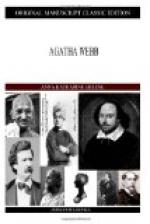The front door was closed, and so were the lower windows, but in one of the upper casements a movement was perceptible, and in another instant there came into view a woman and man, supporting between them the impassive form of Agatha’s husband. Holding him up in plain sight of the almost breathless throng below, the woman pointed to where his darling lay and appeared to say something to him.
Then there was to be seen a strange sight. The old man, with his thin white locks fluttering in the breeze, leaned forward with a smile, and holding out his arms, cried in a faint but joyful tone: “Agatha!” Then, as if realising for the first time that it was death he looked upon, and that the crowd below was a funeral procession, his face altered and he fell back with a low heartbroken moan into the arms of those who supported him.
As his white head disappeared from sight, the procession moved on, and from only one pair of lips went up that groan of sorrow with which every heart seemed surcharged. One groan. From whose lips did it come? Sweetwater endeavoured to ascertain, but was not able, nor could anyone inform him, unless it was Mr. Sutherland, whom he dared not approach.
This gentleman was on foot like the rest, with his arm fast linked in that of his son Frederick. He had meant to ride, for the distance was long for men past sixty; but finding the latter resolved to walk, he had consented to do the same rather than be separated from his son.
He had fears for Frederick—he could hardly have told why; and as the ceremony proceeded and Agatha was solemnly laid away in the place prepared for her, his sympathies grew upon him to such an extent that he found it difficult to quit the young man for a moment, or even to turn his eyes away from the face he had never seemed to know till now. But as friends and strangers were now leaving the yard, he controlled himself, and assuming a more natural demeanour, asked his son if he were now ready to ride back. But, to his astonishment, Frederick replied that he did not intend to return to Sutherland town at present; that he had business in Portchester, and that he was doubtful as to when he would be ready to return. As the old gentleman did not wish to raise a controversy, he said nothing, but as soon as he saw Frederick disappear up the road, he sent back the carriage he had ordered, saying that he would return in a Portchester gig as soon as he had settled some affairs of his own, which might and might not detain him there till evening.
Then he proceeded to a little inn, where he hired a room with windows that looked out on the high-road. In one of these windows he sat all day, watching for Frederick, who had gone farther up the road.
But no Frederick appeared, and with vague misgivings, for which as yet he had no name, he left the window and set out on foot for home.
It was now dark, but a silvery gleam on the horizon gave promise of the speedy rising of a full moon. Otherwise he would not have attempted to walk over a road proverbially dark and dismal.




